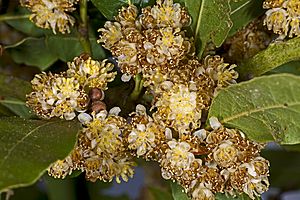Laurales facts for kids
Quick facts for kids Laurales |
|
|---|---|
 |
|
| Laurus nobilis flowers and leaves | |
| Scientific classification | |
| Kingdom: | |
| Phylum: | |
| Class: | |
| Order: |
Laurales
Perleb
|
| Families | |
|
Atherospermataceae |
|
The Laurales are a group of flowering plants. They form an order, which is a way scientists group living things. These plants are considered a very old group of dicots. Dicots are plants that have two seed leaves when they first sprout. The Laurales are related to the Magnoliales, another plant order.
Contents
Discovering the Laurales Order
This plant order includes about 85 to 90 different genera. A genus is a group of closely related species. These genera belong to seven different families of trees and shrubs. Most Laurales plants grow in warm, wet places called the tropics and subtropics. However, some kinds can also be found in cooler temperate areas.
Famous Laurales Plants
Some of the most well-known plants in the Laurales order come from the Lauraceae family. These include the bay laurel (Laurus), which is used in cooking. Cinnamon (Cinnamomum) and avocado (Persea) are also part of this family. Another famous plant is the Sassafras tree. From the Calycanthaceae family, the spice bush (Calycanthus) is also a member of the Laurales.
The Ancient History of Laurales
The oldest known fossils of plants from the Laurales order date back to the Cretaceous period. This was a very long time ago, when dinosaurs still roamed the Earth. Because this order is so old, its plants have changed a lot over time. This means they look very different from each other.
How Scientists Study Laurales
For a long time, it was hard for botanists (plant scientists) to agree on what plants should be in the Laurales order. This was because no single feature or trait was shared by all of them. Today, scientists use modern tools to study these plants. They use molecular and genetic analysis. This means they look at the DNA of the plants. By studying their genes, scientists can now understand how these plants are related. This helps them classify the plants correctly.
See also
 In Spanish: Laurales para niños
In Spanish: Laurales para niños

